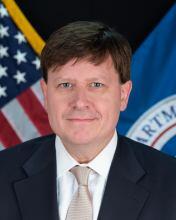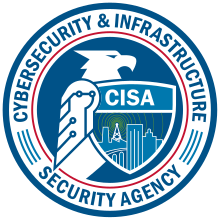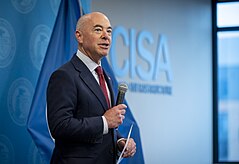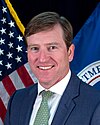
The United States Department of Homeland Security (DHS) is the U.S. federal executive department responsible for public security, roughly comparable to the interior or home ministries of other countries. Its stated missions involve anti-terrorism, border security, immigration and customs, cyber security, and disaster prevention and management.

The domain name gov is a sponsored top-level domain (sTLD) in the Domain Name System of the Internet. The name is derived from the word government, indicating its restricted use by government entities. The TLD is administered by the Cybersecurity and Infrastructure Security Agency (CISA), a component of the United States Department of Homeland Security.

The National Cyber Security Division (NCSD) is a division of the Office of Cyber Security & Communications, within the United States Department of Homeland Security's Cybersecurity and Infrastructure Security Agency. Formed from the Critical Infrastructure Assurance Office, the National Infrastructure Protection Center, the Federal Computer Incident Response Center, and the National Communications System, NCSD opened on June 6, 2003. The NCSD mission is to collaborate with the private sector, government, military, and intelligence stakeholders to conduct risk assessments and mitigate vulnerabilities and threats to information technology assets and activities affecting the operation of the civilian government and private sector critical cyber infrastructures. NCSD also provides cyber threat and vulnerability analysis, early warning, and incident response assistance for public and private sector constituents. NCSD carries out the majority of DHS’ responsibilities under the Comprehensive National Cybersecurity Initiative. The FY 2011 budget request for NCSD is $378.744 million and includes 342 federal positions. The current director of the NCSD is John Streufert, former chief information security officer (CISO) for the United States Department of State, who assumed the position in January 2012.
An information assurance vulnerability alert (IAVA) is an announcement of a computer application software or operating system vulnerability notification in the form of alerts, bulletins, and technical advisories identified by US-CERT, https://www.us-cert.gov/ US-CERT is managed by National Cybersecurity and Communications Integration Center (NCCIC), which is part of Cybersecurity and Infrastructure Security Agency (CISA), within the U.S. Department of Homeland Security (DHS). CISA, which includes the National Cybersecurity and Communications Integration Center (NCCIC) realigned its organizational structure in 2017, integrating like functions previously performed independently by the U.S. Computer Emergency Readiness Team (US-CERT) and the Industrial Control Systems Cyber Emergency Response Team (ICS-CERT). These selected vulnerabilities are the mandated baseline, or minimum configuration of all hosts residing on the GIG. US-CERT analyzes each vulnerability and determines if it is necessary or beneficial to the Department of Defense to release it as an IAVA. Implementation of IAVA policy will help ensure that DoD Components take appropriate mitigating actions against vulnerabilities to avoid serious compromises to DoD computer system assets that would potentially degrade mission performance.
The EINSTEIN System is a network intrusion detection and prevention system that monitors the networks of US federal government departments and agencies. The system is developed and managed by the Cybersecurity and Infrastructure Security Agency in the United States Department of Homeland Security (DHS).
Phil Reitinger was the Deputy Under Secretary of the National Protection and Programs Directorate (NPPD) and Director of the National Cybersecurity Center (NCSC) at the United States Department of Homeland Security from 2009 to 2011. During that time, Reitinger led the department's integrated efforts to reduce risks across physical and cyber infrastructures and helping secure federal networks and systems by collecting, analyzing, integrating and sharing information among interagency partners.

The Director of the Cybersecurity and Infrastructure Security Agency is a high level civilian official in the United States Department of Homeland Security. The Director, as head of Cybersecurity and Infrastructure Security Agency at DHS, is the principal staff assistant and adviser to both the Secretary of Homeland Security and the Deputy Secretary of Homeland Security for all DHS programs designed to reduce the nation's risk to terrorism and natural disasters. The Director is appointed from civilian life by the President with the consent of the Senate to serve at the pleasure of the President.
The National Cybersecurity Alliance (NCA), is an American nonprofit 501(c)(3) organization which promotes cyber security awareness and education. The NCA works with various stakeholders across government, industry, and civil society, promoting partnerships between the federal government and technology corporations. NCA's primary federal partner is the Cybersecurity and Infrastructure Security Agency within the U.S. Department of Homeland Security.

The Cybersecurity Information Sharing Act is a United States federal law designed to "improve cybersecurity in the United States through enhanced sharing of information about cybersecurity threats, and for other purposes". The law allows the sharing of Internet traffic information between the U.S. government and technology and manufacturing companies. The bill was introduced in the U.S. Senate on July 10, 2014, and passed in the Senate on October 27, 2015. Opponents question CISA's value, believing it will move responsibility from private businesses to the government, thereby increasing vulnerability of personal private information, as well as dispersing personal private information across seven government agencies, including the NSA and local police.
The Center for Internet Security (CIS) is a US 501(c)(3) nonprofit organization, formed in October 2000. Its mission statement professes that the function of CIS is to " help people, businesses, and governments protect themselves against pervasive cyber threats."
The National Cybersecurity and Communications Integration Center (NCCIC) is part of the Cybersecurity Division of the Cybersecurity and Infrastructure Security Agency, an agency of the U.S. Department of Homeland Security. It acts to coordinate various aspects of the U.S. federal government's cybersecurity and cyberattack mitigation efforts through cooperation with civilian agencies, infrastructure operators, state and local governments, and international partners.

Alex Stamos is an American computer scientist and adjunct professor at Stanford University's Center for International Security and Cooperation. He is the former chief security officer (CSO) at Facebook. His planned departure from the company, following disagreement with other executives about how to address the Russian government's use of its platform to spread disinformation during the 2016 U.S. presidential election, was reported in March 2018.

The Cybersecurity and Infrastructure Security Agency Act of 2018 was signed by president Donald Trump on November 16, 2018, to establish the Cybersecurity and Infrastructure Security Agency under the Department of Homeland Security. The act was introduced into the United States House of Representatives by Michael McCaul (R-TX-10) on July 24, 2017. It received committee consideration from the House Homeland Security, House Energy and Commerce, House Oversight and Government Return, and House Transportation and Infrastructure, though it was discharged by the Committee on Energy and Commerce, the Committee on Government Oversight and Return, and the Committee on Transportation. It passed the House of Representatives on December 11, 2017, via vocal vote, passed the Senate on October 3, 2018, by unanimous consent, and agreed upon by the House again on November 13, 2018.

Matthew Travis is a businessman and former American government official. He served as the Deputy Director for the Department of Homeland Security's Cybersecurity and Infrastructure Security Agency (CISA). Travis served as Deputy Under Secretary for the National Protection and Programs Directorate (NPPD) before the agency became CISA on November 16, 2018.

Christopher Cox Krebs is an American attorney who served as Director of the Cybersecurity and Infrastructure Security Agency in the United States Department of Homeland Security from November 2018 until November 17, 2020, when President Donald Trump fired Krebs for contradicting Trump's claims of election fraud in the 2020 presidential election.

Brandon D. Wales is an American national security official who served as the acting director of the Cybersecurity and Infrastructure Security Agency. Wales assumed office after President Donald Trump fired Chris Krebs, and previously served as first executive director of the agency.

In 2020, a major cyberattack suspected to have been committed by a group backed by the Russian government penetrated thousands of organizations globally including multiple parts of the United States federal government, leading to a series of data breaches. The cyberattack and data breach were reported to be among the worst cyber-espionage incidents ever suffered by the U.S., due to the sensitivity and high profile of the targets and the long duration in which the hackers had access. Within days of its discovery, at least 200 organizations around the world had been reported to be affected by the attack, and some of these may also have suffered data breaches. Affected organizations worldwide included NATO, the U.K. government, the European Parliament, Microsoft and others.

Jen Easterly is an American intelligence and former military official who is serving as the director of the Cybersecurity and Infrastructure Security Agency in the Biden administration. She was confirmed by a voice vote in the Senate on July 12, 2021.
Operational collaboration is a cyber resilience framework that leverages public-private partnerships to reduce the risk of cyber threats and the impact of cyberattacks on United States cyberspace. This operational collaboration framework for cyber is similar to the Federal Emergency Management Agency (FEMA)'s National Preparedness System which is used to coordinate responses to natural disasters, terrorism, chemical and biological events in the physical world.

The Disinformation Governance Board (DGB) was an advisory board of the United States Department of Homeland Security (DHS), announced on April 27, 2022. The board's stated function was to protect national security by disseminating guidance to DHS agencies on combating misinformation, malinformation, and disinformation that threatens the security of the homeland. Specific problem areas mentioned by the DHS included false information propagated by human smugglers encouraging migrants to surge to the Mexico–United States border, as well as Russian-state disinformation on election interference and the 2022 Russian invasion of Ukraine.
















